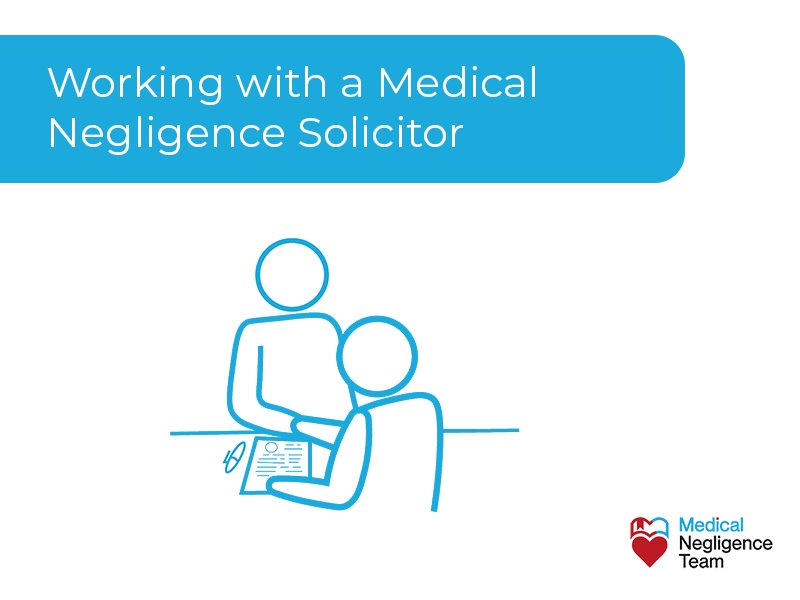Pharmacy negligence is when pharmacy staff give you the wrong medicine. You expect to get the right medicine from your pharmacist. You trust them to read your prescription correctly and give you the medication as prescribed by a doctor.
What you do not expect is to get the medicine not on your prescription. The effects of the wrong medication are serious.
Getting ill, not getting better and experiencing symptoms completely unexpected should not happen but will with pharmacy negligence.
You can claim compensation for losses and suffering from pharmacy negligence.
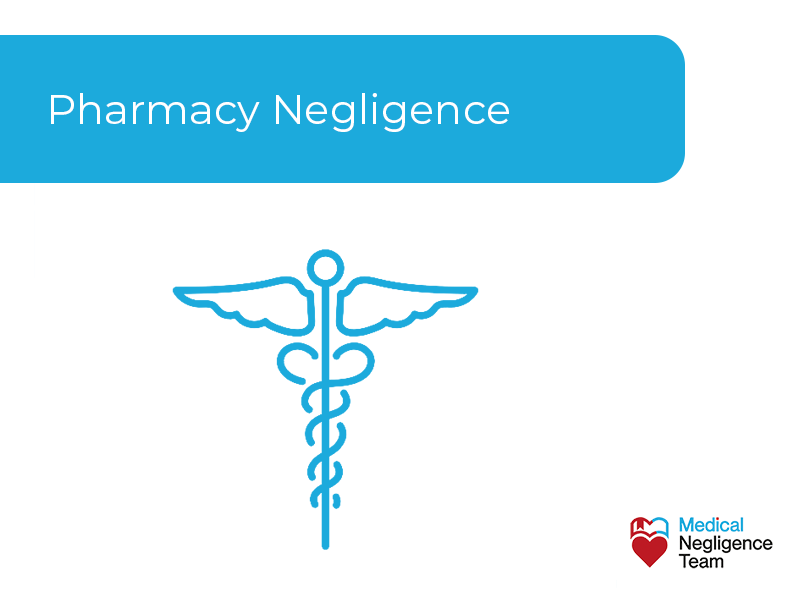
Table of content
What is pharmacy negligence?
Pharmacy negligence is when a pharmacy gives you medicine from the incorrect reading of a prescription, the wrong medication, or someone else’s.
Negligence can happen due to inexperienced or poorly trained staff in the pharmacy.
Staff shortages in the pharmacy are not your problem, but they will affect you if, as a result, pharmacy negligence happens. Even trained staff, under pressure from being too busy, make mistakes, but it is the pharmacy’s responsibility to ensure oversight does not happen.
In almost all pharmacy negligence claims, the label on the box will have been correct. It will have your name, and of the medication you are supposed to have received. Sadly, it will be the medication which is incorrect. People rarely notice the wrong medicine as generic medication suppliers have different boxes, tablet colours and sizes.
It is the pharmacist’s job not to make the mistake. You trust your pharmacy to get the medicines right, not to make you ill from the pharmacy’s negligence.
Is pharmacy Negligence avoidable
Pharmacy negligence should not occur, as two pharmacists should double-check all prescriptions before being handed to you.
Unfortunately, pharmacy negligence cases are very common. They happen every day and result in compensation claims for pharmacy negligence being filed and paid to those who suffered.
The side effects of getting the wrong medication can be allergic reactions, harmful interactions with other medicines, or you being very ill. Your original condition and symptoms will not improve, and instead of you getting better, you will more than likely get a lot worse.
The long-term effects of not treating your condition correctly can be serious for your health.
Pharmacy negligence happens a lot more often than you may think.
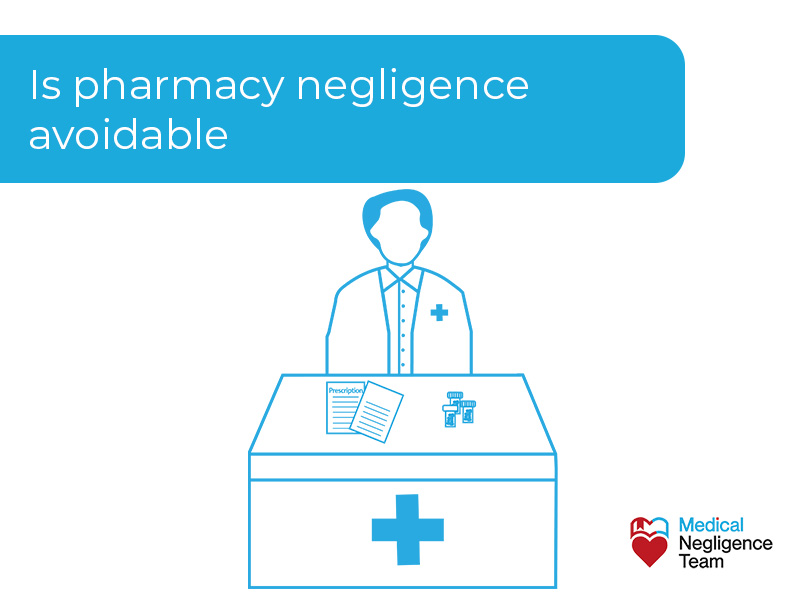
Can I claim for pharmacy negligence?
You can claim for pharmacy negligence by contacting a medical negligence solicitor. The process is generally quick and easy. Pharmacy negligence compensation cases tend to be settled a lot quicker than NHS negligence cases.
You will need a No Win No Fee pharmacy negligence solicitor and one who pays you 100% of the pharmacy negligence compensation you receive. If you win your pharmacy negligence case, your pharmacy negligence solicitor will be paid by the negligent pharmacy’s insurers.
You may find that some solicitors will try and take a cut of your compensation, often up to 25% of the final figure. There is no need to agree to this deduction as there are pharmacy negligence solicitors who will pay you 100% of the compensation recovered.
What are the types of pharmacy negligence?
The types of pharmacy negligence include:
Each type of pharmacy negligence is avoidable.
You may quickly notice if you have suffered from pharmacy negligence. Symptoms such as nausea, weakness, and generally feeling bad may not take long to surface.
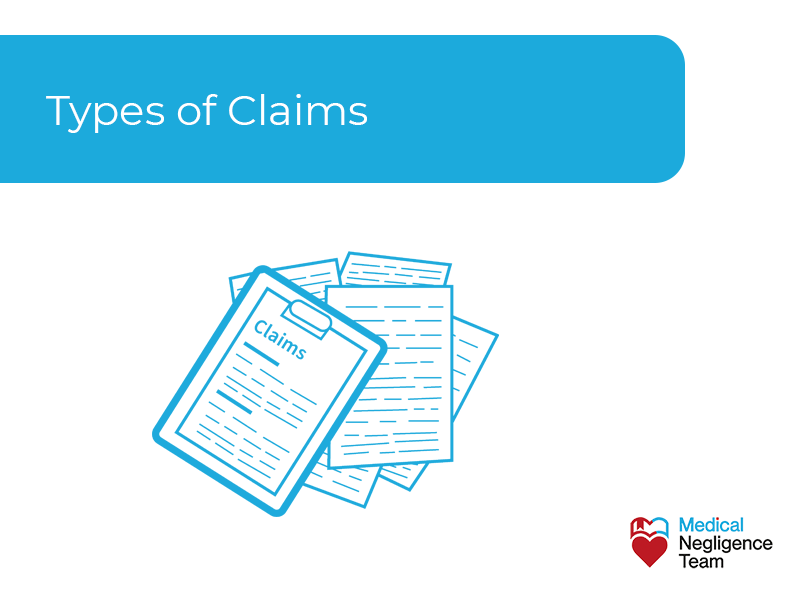
Other symptoms may take longer to appear or can be so severe that you need hospitalisation. Regardless of what happens, you can be due compensation for the results of pharmacy negligence.
A brief look at the types of pharmacy negligence and their effects will help you recognise if something similar has happened to you.
Being given the wrong medication claim
Being given the wrong medication can happen in several ways. The pharmacist may misread the prescription, take the wrong medication from the storage box or give you a generic one when you should have a branded medicine.
Pharmacy negligence has multiple impacts when you are given the wrong medication.
One common pharmacy negligence error is when someone is on antidepressant medication such as paroxetine or quetiapine but is given a completely different medication by mistake.
Suddenly your body experiences withdrawal effects from not getting the correct medicine. Previously controlled symptoms return with a bang, and the results can be frightening.
The wrong medication can only make your condition worse.
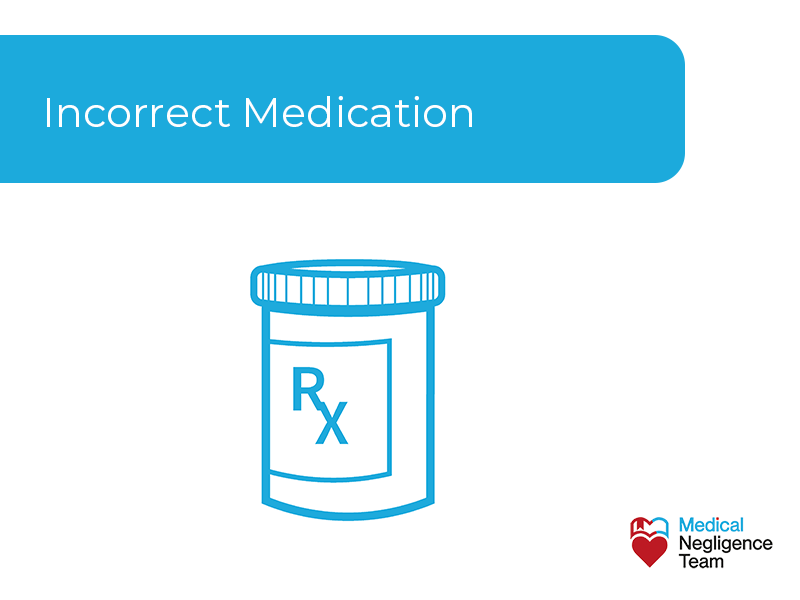
Being given the wrong dose of medication claim
Being given the right medication but the wrong dose is very dangerous and could be fatal. They have your prescription from a doctor
If your pharmacy gives you a box of 500MG tablets when it should be 250MG, you are getting double the dose your doctor wants you to take. With an epilepsy drug such as Tegretol, a too high dose can damage your liver over time.
On the other hand, when the doctor prescribes 500Mg of Tegretol but the pharmacy gives you 250MG tablets, it can have a devastating effect. Your epilepsy does not improve, and your doctor stops a medicine which could work at the correct dose.
Avoidable mistakes with a dose may have serious long-term consequences.
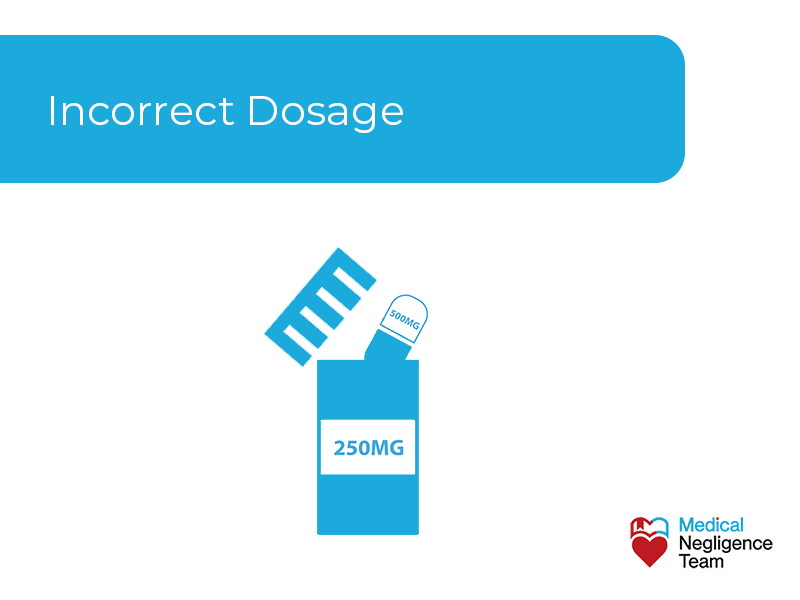
Being given the wrong prescription claim
Being given someone else’s medication instead of your own is another mix-up which should never happen at the pharmacy.
The pharmacist puts the medicine prescribed for another person in the queue into your bag. Your name is on the bag, and you take it home. If you take the wrong medication, you could be in serious trouble. Allergic reactions, nausea and even seizures are common side effects of taking someone else’s prescription.
Taking someone else’s medication will make you ill and can keep you off work.
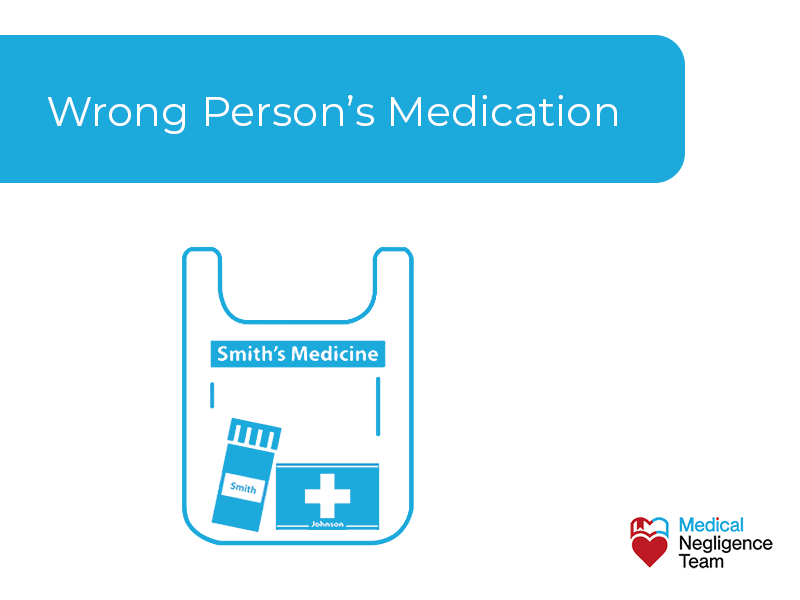
Incorrect storage of medication claim
Incorrect storage of medication is when the pharmacy does not store medicines safely. Whatever the cause, incorrect storage of medication can have serious side effects on you, the customer.
Types of incorrect storage of medication include:
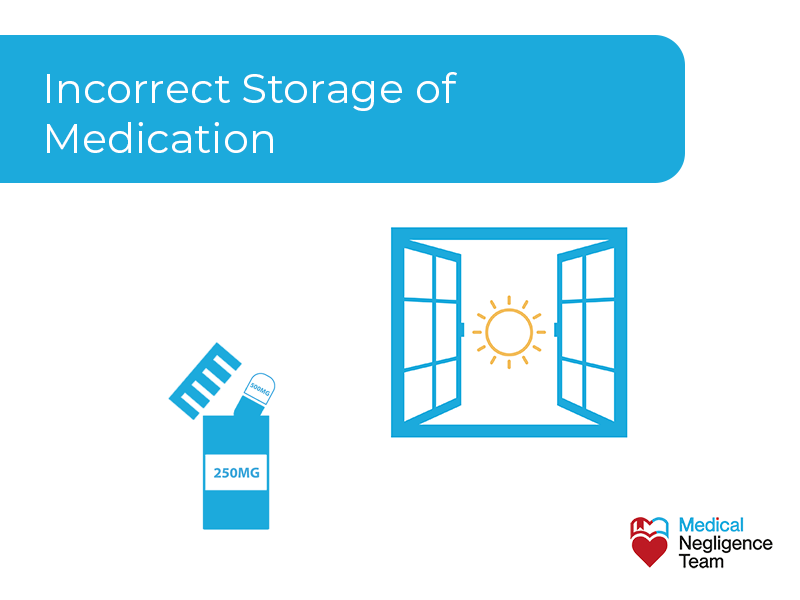
If a medicine is not stored correctly, it will not work as prescribed. Breaking the cold chain, not keeping the medicine in the fridge, kills any active ingredients.
When stock management is poor in the pharmacy, they can mix up expiry dates or give you the wrong strength of a medicine. Giving a patient a 500Mg pill instead of a 1000Mg one can make someone very ill.
When the pharmacist does not store medicine in its original packaging, it can be difficult to tell it from others or know the correct dose instructions.
The pharmacy must store all medication correctly. Incorrect storage of medication can lead to errors that make you very ill.
Impact of Pharmacy negligence
Pharmacy negligence has multiple impacts on you and your family.
You do not get the medication you should have, which can make you ill. The difficult to deal with symptoms can appear again and set back your recovery.
In many cases, the body may have become used to a medicine, and it can be very dangerous to stop any medication abruptly. You could also be taking medication you should not be and experiencing the side effects.
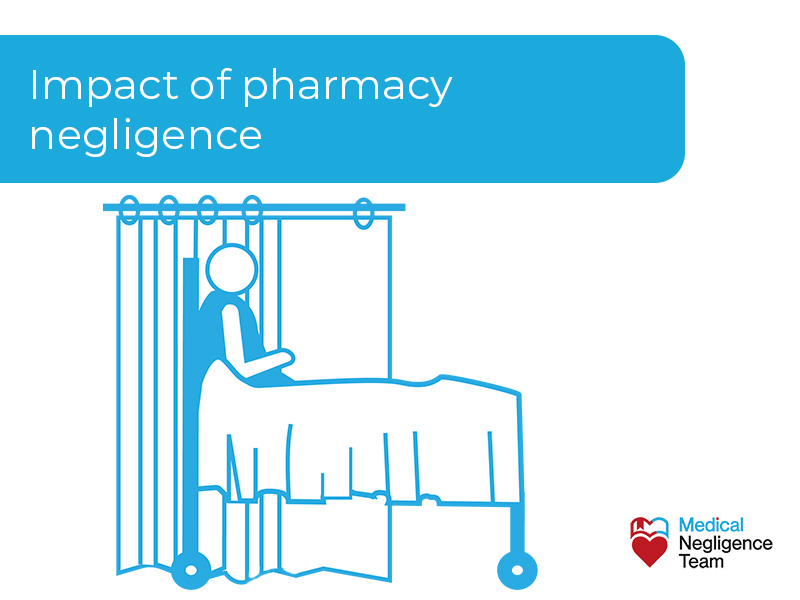
It can take time for signs of pharmacy negligence to surface
It can take time for the signs of pharmacy negligence to surface due to the way a medicine works. Even when the mistake is realised, it will take time for your correct medication to start working again.
Sometimes it can take weeks or months to get back to where you were before the pharmacy negligence. During this time you will have been ill and possibly have lost earnings due to being unable to work.
You can claim pharmacy negligence compensation for these losses.
Steps in making a pharmacy negligence case
The steps to taking a pharmacy negligence case are easy to follow. As pharmacy negligence cases are usually quite obvious, when you follow the steps below, the pharmacy should settle your case quickly.
Step 1: Take photographs of medicines
Take photographs of the medicines as soon as you realise all is not right with them. You should take clear pictures showing the label, medication box (or bottle) and the box’s contents (blister pack).
Do this before returning the medication to the pharmacy to get your correct medicines.
Step 2: Finding a No Win No Fee pharmacy negligence solicitor
Finding a No Win No Fee pharmacy negligence solicitor should be your next step in the process. You need to find a solicitor with the experience and the expertise to fight and win your case.
If you have taken those photographs, send them to your solicitor.
Your pharmacy negligence solicitor will be ready to take your case and know exactly how to proceed with it.
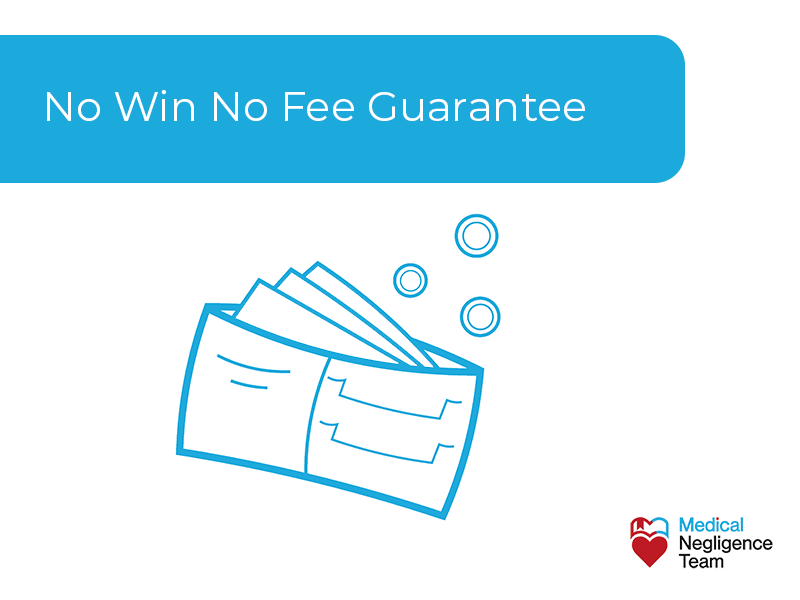
Step 3: Filing Your Compensation Claim With The Pharmacy
Filing your compensation claim with the pharmacy is the final step in the process. It may seem obvious, but only by taking a claim can you get the compensation you deserve for pharmacy negligence.
Your pharmacy negligence solicitor will do all the paperwork for the case. They may need you to get a medical opinion on the effects of what happened, and the doctor will write a report on your case.
The more backup details you have for the pharmacy negligence, the quicker and easier it will be to get your compensation.
How long do I have to make a claim after suffering pharmacy negligence?
You have three years to make a claim after suffering pharmacy negligence. The three-year time limit begins from the day you are aware of the facts of a pharmacy negligence claim this is know your date of knowledge such as the date you realise that your have been taking the incorrect medication.
Sometimes the effect of pharmacy negligence may not become obvious for a long time. You could take the wrong medication for many years before becoming ill.
It could be as simple as telling someone you fell sick, and they point out it must be due to pharmacy negligence.
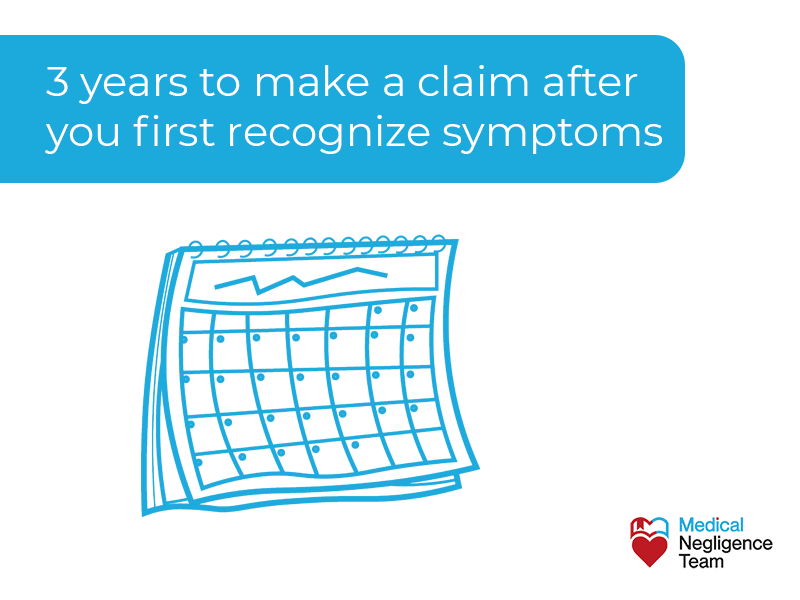
For children under 18, the three-year time limit only begins from the day they turn 18. In effect, children have until they reach 21 to file a pharmacy negligence compensation claim. Children under 18 can sue for pharmacy negligence through their parents or a trusted guardian.
While the time limit to make a claim is 3 years, it is still important to make your claim as soon as possible.
How much compensation will I receive for a medical negligence claim?
You will receive compensation from the low £1000s to more than £1m for a medical negligence claim. The amount you receive depends on the severity of the negligence and the long-term effects on you or a loved one.
The most compensation paid in the UK was £24m to a woman permanently disabled due to negligence during surgery. Other amounts are less dramatic, but the average pharmacy negligence claim pays £1,000 to £2,500.
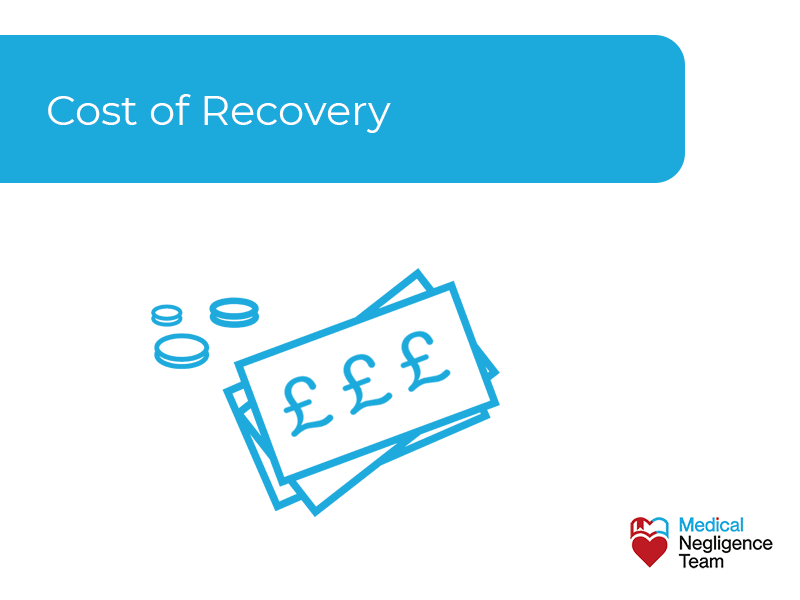
Types of Pharmacy negligence compensations
General damages
General damages are when you seek compensation for pain, illness, discomfort and undue suffering due to the pharmacy’s negligence.
Special damages
Special damages are for the loss of income and compensation for any costs incurred due to the pharmacy negligence. They cover all expenses such as travel and medical appointments. You can sue for loss of future earnings if you cannot work due to the pharmacy’s negligence.
The Medical Negligence Team solicitor will advise you on what compensation you can expect to receive.
Finding a pharmacy negligence solicitor near to home
Finding an expert pharmacy negligence solicitor will make the process a lot easier to handle. Ensure you have a pharmacy negligence solicitor who operates nationally
A friendly voice can make the path to a successful pharmacy negligence claim a lot easier to travel.
The Medical Negligence Team undertakes pharmacy negligence claims across England and Wales. We fight all cases on a No Win No Fee policy, and all our clients’ wins are on a 100% Compensation Guarantee basis.
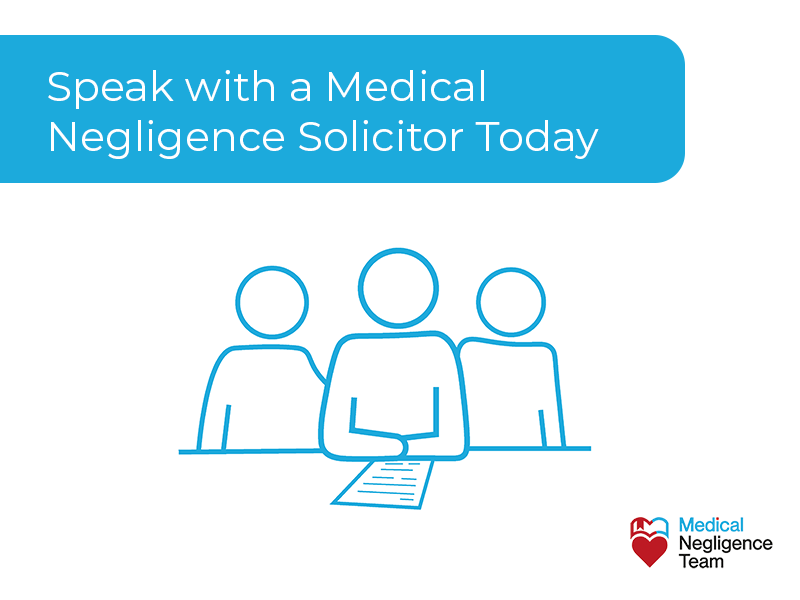
Make a pharmacy negligence claim today
Finding an expert medical negligence solicitor will make the process a lot easier to handle. Ensure you have a pharmacy negligence solicitor who operates nationally
The Medical Negligence Team undertakes pharmacy negligence claims across England and Wales. We fight all cases on a No Win No Fee policy, and all our clients’ wins are on a 100% Compensation Guarantee basis.
